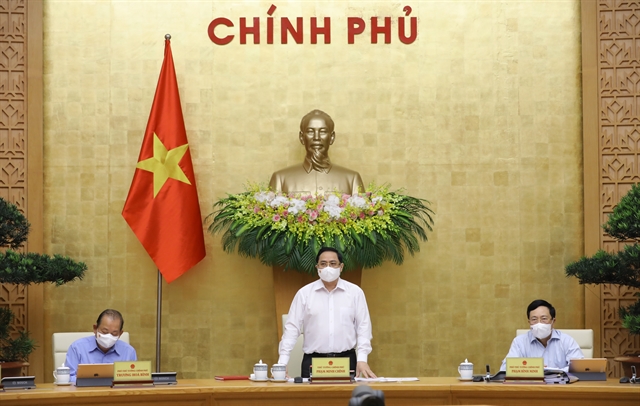 Society
Society


|
| Prime Minister Phạm Minh Chính chairs the Government meeting on Wednesday. — VNA/VNS Photo |
HÀ NỘI — Prime Minister Phạm Minh Chính on Wednesday presided over the Government’s April meeting, which was the first meeting of the Cabinet after it completed the personnel work last month.
During the meeting, Government members considered issues related to the fight against COVID-19, and preparations for the upcoming elections of deputies to the 15th National Assembly and all-level People’s Councils for the 2021-2026 tenure.
They also looked into the Government’s draft action programme on the implementation of the Resolution adopted at the 13th National Party Congress, and the socio-economic situation in April and the first four months of this year, among others.
In his remarks, PM Chính highlighted significant achievements in the macro-economy, export and investment attraction, notably inflation control, which are regarded as the best since 2016.
The government leader, however, pointed out difficulties and challenges such as the complex developments of the COVID-19 pandemic and its socio-economic impacts, plus “land fever” and issues regarding the stock market.
Thanks to the timely instructions of the Government, ministers and the State Bank of Việt Nam, the situation has stabilised, he said, stressing the importance of monetary and banking policies to the macro economy.
The PM also talked about poor-performing projects, law-related issues, the slow disbursement of public investment capital, especially foreign investment, and illegal exit-entry activities.
To complete the dual goals of socio-economic development and fighting the pandemic, PM Chính asked ministries and agencies to review and perfect mechanisms and policies, saying priorities should be given to resources in service of national development.
He ordered more flexible monetary and fiscal policies to spur growth, stabilise the macro economy, curb inflation, and ensure major economic balances, and urged greater efforts to remove obstacles in production and business, and creating a favourable, equal business environment.
Greater efforts are also needed to study and implement transport projects in the Mekong Delta, the Central Highlands and key economic regions, the leader said.
Regarding the pandemic, PM Chính requested agencies to stay alert, creative and flexible in the work, saying information must be objective to encourage people to actively engage in the combat and overcome the consequences.
He called on Vietnamese people both at home and abroad to voluntarily observe COVID-19 prevention and control regulations.
The PM also highlighted preparations for the upcoming elections of deputies to the 15th legislature and all-level People’s Councils, as well as the national high school graduation exam.
Minister-Chairman of Government Office Trần Văn Sơn told the monthly Government press conference later the same day that Việt Nam’s economy in April and the first four months of 2021 saw positive signs.
April's CPI inched up 0.89 per cent, the lowest level since 2016. Four-month State budget revenue made up 40.5 per cent of the yearly plan and was 7.9 per cent higher than the same period last year.
Four-month foreign trade grew by 29.5 per cent year-on-year, with trade surplus reaching US$1.29 billion. The Index of Industrial Production (IIP) was up 24.1 per cent in April and 10 per cent from January – April.
The country has so far disbursed 18 per cent of public investment, higher than a year earlier, Sơn noted.
He urged relevant authorities to come up with measures to remove barriers in terms of legal institutions, mechanisms and policies so as to release resources for development; and at the same time accelerate the progress of disbursement of public investment, particularly ODA, and speed up major projects.
More attention should be paid to helping farmers distribute their products, he said, adding that ministries and local administrations must also maintain a close watch on the development of prices of fuel and products and report to the government in order to keep inflation under control. — VNS